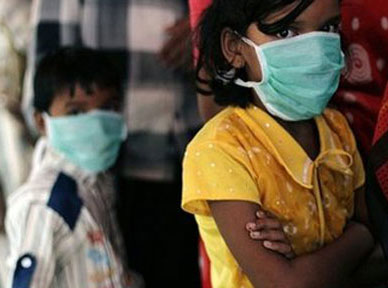When do children need vaccines or anti-H1N1 drugs?
A new study published in the British Journal of Medicine, BMJ, said that treating flu with Tamiflu and Relenza drugs has ' little benefit ' for children under 12, but may have serious side effects. .
Currently, even though the new study looks at four cases of children treated for seasonal flu, people have paid attention to an important issue: how to treat or not treat children, or Is the child himself able to resist the H1N1 pandemic?
One of the top concerns of parents, pharmaceutical and medical control agencies is: Do children need to be treated or vaccines against a pandemic are largely unknown?
We need to recall the deadly complications of flu vaccines that exist primarily in pigs in 1976. No one died of the flu virus but there were dozens of people died of vaccine complications.

Indian children queue up for H1N1 flu test at Naidu hospital in Pune (Photo: AP)
Some studies suggest that Tamiflu may be more beneficial for children with chronic conditions such as asthma, but it is also associated with some unwanted side effects in children such as psychiatric abnormalities in there is delirium or suicide action.
The fundamental problem is that, so far, no one has been able to say with certainty the value of treatment or the use of flu vaccines because no one knows exactly how dangerous the pandemic will be. It will be inevitable that side effects from treatment drugs.
If the pandemic becomes severe, there will be some children with a stomach disorder caused by taking Tamiflu. The more important thing is to help them avoid the deadly epidemic.
But if the pandemic flu gets worse and the children don't get sick, it's not necessary for an arm to hurt because of the new flu vaccine. The best strategy may become apparent in the next few weeks, when seasonal flu starts. However, it is still not possible to have a clear answer until the pandemic passes.
- Thailand's cabinet meets urgently, spending 25 million USD against influenza A / H1N1
- Vietnam influenza A / H1N1 vaccine may be released after 6 months
- 3 common misunderstandings about vaccines
- The Pasteur Institute in Ho Chi Minh City successfully produced the H1N1 vaccine
- How are Pentaxim and Quinvaxem vaccines different?
- Things to know about 5 in 1 vaccines and 6 in 1 vaccines
- There is going to be a vaccine against all flu
- Upcoming drugs to fight H1N1 virus
- My mother has H1N1 flu, my baby is dead easily
- Priority for anti-H1N1 drugs for young people?
- The second patient in the South died of H1N1 flu
- Vaccines against influenza A / H1N1 cause mild side effects
 Green tea cleans teeth better than mouthwash?
Green tea cleans teeth better than mouthwash? Death kiss: This is why you should not let anyone kiss your baby's lips
Death kiss: This is why you should not let anyone kiss your baby's lips What is salmonellosis?
What is salmonellosis? Caution should be exercised when using aloe vera through eating and drinking
Caution should be exercised when using aloe vera through eating and drinking